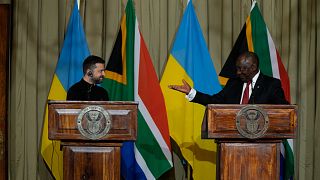South Africa
Medical advocacy groups welcomed Johnson & Johnson’s decision not to enforce its patent on a critical tuberculosis medication, allowing its production at much lower prices after South African authorities investigated the conglomerate.
The South African Competition Commission in a statement on July 5 said it decided not to prosecute a complaint against J&J regarding “allegations of abuse of dominance,” which was prompted after J&J and its subsidiary filed a secondary patent for bedaquiline last year, used to treat drug-resistant TB.
Experts argued that the patent prevented generic producers from making cheaper medicines, threatening the treatment of tens of thousands of people in South Africa, where TB killed more than 50,000 people in 2021, making it the country’s leading cause of death.
Authorities said J&J has now agreed not to enforce its patent and to drop the price charged to South Africa by about 40%.
“We hope this sends a strong message to pharma that they cannot continue their anti-competitiveness monopoly and prioritize profits over people's lives,” said Candice Sehoma, an advocacy adviser at Doctors Without Borders in South Africa.
Sehoma told the Associated Press Tuesday that she hoped generic manufacturers within South Africa would be able to start producing bedaquiline in the coming years, adding that Indian factories already make the drug.
Last year, activists in countries including India, Belarus and Ukraine protested against efforts by J&J to protect its patent on bedaquiline, but obtained little response. J&J applied to extend its South Africa patent until 2027, enraging activists who accused it of profiteering.
In an unusual move challenging the influence of big pharmaceuticals, the South African government began investigating the company’s pricing policies. The country had been paying about 5,400 rand ($282) per treatment course, far more than poor countries that got the drug via a global effort called the Stop TB Partnership.
Fatima Hassan, the founder of the activist group Health Justice Initiative in South Africa, pointed out that patenting strategies for other key medicines for diseases including HIV, cancer and cystic fibrosis, might also be investigated by regulatory agencies for their pricing policies.
“Going forward, pharmaceutical corporations need to be held in check and to account," Hassan said in a statement.











00:47
Ghana: President Mahama suspends Chief Justice Gertrude Torkornoo
Go to video
Police rescue 33 West Africans from a human trafficking scam in Ivory Coast
Go to video
Pope Francis' funeral scheduled Saturday April 26
Go to video
Al-Qaida-linked militants attack a strategic town in Somalia
Go to video
Trump administration threatens Harvard over foreign student visas and protest ties
Go to video
The EU moves to fast-track asylum claims by migrants from 7 countries to speed deportation